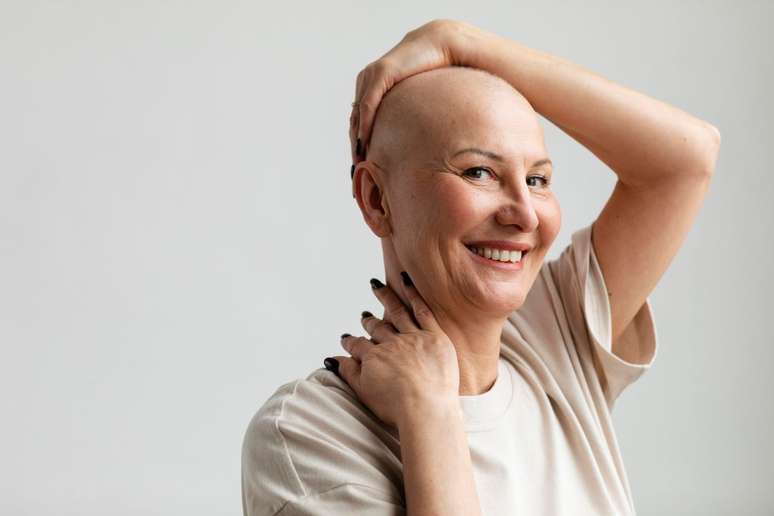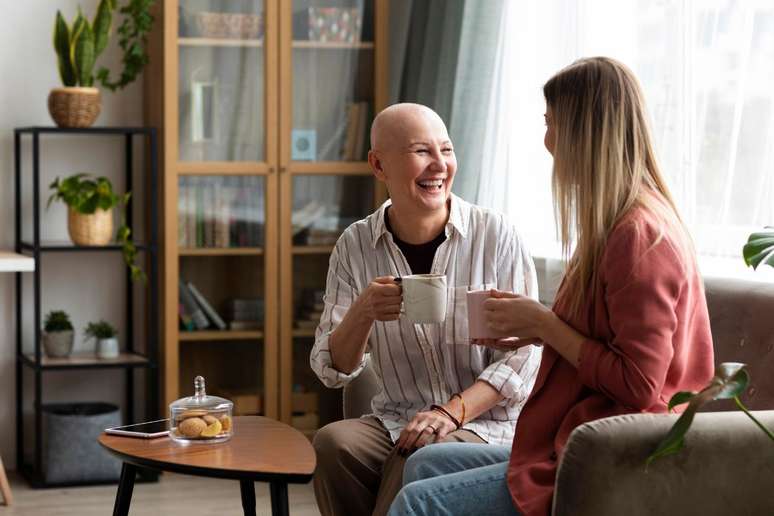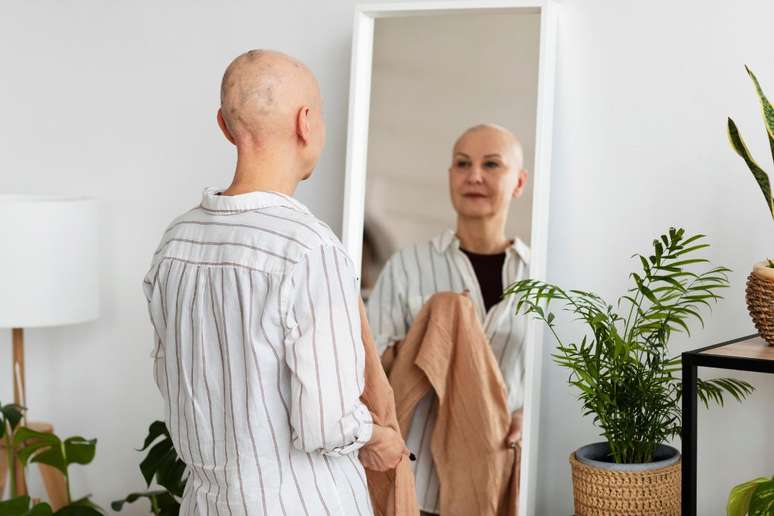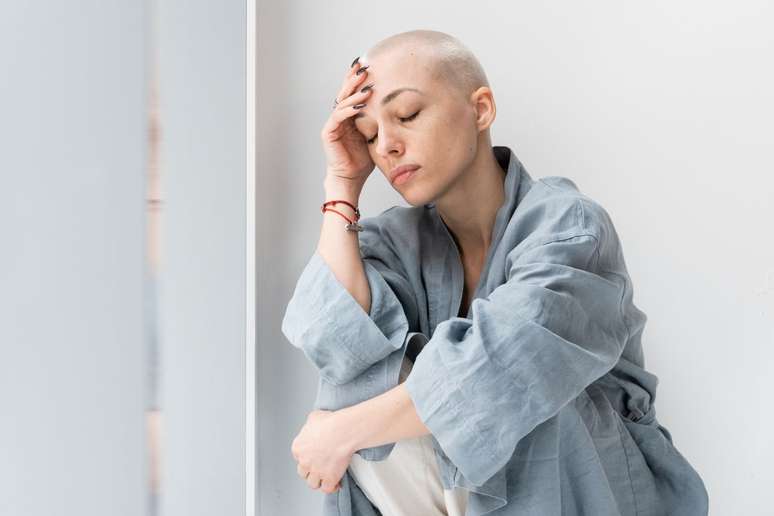Sadness, anxiety and uncertainty are issues that negatively impact the quality of life of people diagnosed with cancer
Being diagnosed with cancer can affect individuals’ feelings and emotions. In addition to the physical effects, the treatment of this disease involves a number of fears, insecurities and uncertainties, which profoundly affect the patient’s mental health.

According to the psycho-oncologist Luciana Holtz, founder and president of Instituto Oncoguia, many have complaints such as difficulty sleeping, weight gain or loss, anxiety, stress, anguish and fear.
He also says that there is the possibility of confusing the side effects of the treatment with other alterations that derive from the mental part, which can make it difficult to diagnose problems such as depression.
“For example, depending on the treatment, the person is expected to be tired or fatigued for a while. However, you need to know how to differentiate whether this is an expected symptom of the treatment or not, whether it is something that needs a closer look careful on the part of a health professional.health”, warns the specialist.
Michele SalekNow 32, she was diagnosed with breast cancer at 26 and reports that when she found out about the disease, she felt fear, mostly because she didn’t know if the treatment would work or not.

“The day after my diagnosis, I woke up and went after everything in my power to survive, I started running after doctors, consultations and it made it into my head that all I wanted most was to survive and that I would do whatever was necessary for this,” he says, showing that despite the uncertainties, he has not lost the will to fight the disease.
Even after recovery, many people continue to grapple with one fear: repeating the problem. “We did a survey which showed that the fear of cancer coming back is something very present in the vast majority of patients. Generally, this fear is quite overlooked, as patients rarely talk about this topic and find no space to talk to the support network or with oncologists, for example”, points out the psycho-oncologist.
THE IMPORTANCE OF THE SUPPORT NETWORK

According to Michele, who has seen her marriage failing cancer treatment, her maternal grandmother, 89, who lives in Rio de Janeiro, was her companion during cancer treatment in São Paulo and an important support for her to be able to deal with the situation.
“She stayed with me throughout my chemotherapy and was my right hand man, because we end up feeling lonely and scared. Then, she helped me with meals and encouraged me to fight back, because there were days when I was very frustrated and in bed”. , describes Salek, who has had a mastectomy on both breasts, 16 sessions of chemotherapy, 28 sessions of radiotherapy and hormone therapy.
More often than not, a cancer diagnosis scares patients, leaving them sad, worried and thoughtful. Therefore, whether indoors or in other environments, such as clinics, hospitals and online groups, having people you can count on is essential for patients. These relationships need to involve transparent, empathetic and caring dialogue, ensuring that people are able to open up and say how they feel.
Additionally, a support network helps identify if the patient has symptoms that may indicate more serious mental disorders, according to Luciana. “You have to be careful when the sadness doesn’t go away, as this could suggest that depression has set in, leading to the need to seek out a mental health professional,” she points out.
SELF-ESTEEM

Cancer can destroy the self-esteem of several patients, as the treatments used to fight the disease bring a series of side effects that affect emotional stability and bring discomfort such as hair loss, the need to remove the breast, weight change and skin changes.
“The mastectomy itself wasn’t a problem for me, because in the same surgery that removed the breasts, I reconstructed them and put in a prosthesis,” Michele begins.
However, Salek says the treatment caused her to gain weight, which ended up hurting her self-esteem. “I gained weight and that ended up affecting me a little bit, because I’ve always been a very body-attached person,” she explains.
“”
“I’ve lost my eyebrows, my eyelashes. I’ve always liked wearing makeup, I used to say that my favorite makeup was mascara and, suddenly, I no longer had eyelashes. It’s a transitory situation, but it affects you “, she adds. .
As for weight gain, he points out that he has had difficulty losing it even after the end of the therapies used to fight cancer, but that the practice of physical activity has been an excellent ally to return to a body of which he was more satisfied.
“When a woman has a mastectomy, her self-esteem is shaken. In no case should we blame or devalue that person’s grievances and feelings. This removal of the breast represents the loss of an extremely important organ for the woman, which must be done with femininity and sexuality, therefore it is very important to explain to the patient what can happen, whether or not breast reconstruction can be immediate after surgery and all the other details”, begins Luciana Holtz.
“The loss of hair and other body hair and weight change are other aspects that negatively affect the self-esteem of countless patients,” adds the psycho-oncologist.
MENTAL HEALTH

To promote the mental health and well-being of cancer patients, Luciana Holtz emphasizes the importance of access to quality information.
“If the patient can overcome that confusion about what is a source of quality, they start preparing and anticipating certain things that can happen. It makes a difference knowing that something can happen rather than experiencing something out of the blue and without any preparation. Also, there is also a lot of information relating to patient rights, quality of life and supportive advice. Of course, these things may not apply to everyone, but they can be useful, “the specialist points out.
The psycho-oncologist also plays an essential role when it comes to improving the quality of life of people diagnosed with this disease, since, according to Luciana, this professional has a vision focused on feelings and can help them, for example , to face the journey seeking healing and decision making.
In addition to dealing with breast cancer, Michele has also suffered from depression following her diagnosis.
“When I realized that depression was a disease like any other, I did what I would do with any condition: I sought out a psychiatrist and went to counseling with a psychologist. So, my advice is: deal with depression like a serious condition and needs proper treatment,” he points out.
According to Salek, who currently works as a paralegal and is a jiu-jitsu athlete, physical activity is the “greatest antidepressant” he has ever known. “There were several days when I didn’t want to get out of bed and jiu jitsu motivated me.”
2nd EDITION FESTIVAL HEALTH SELFCARE
The second edition of the Self-Care in Health Festival, conducted by the Oncoguia Institute, takes place from 1 to 4 February and has the theme “Because it is possible to be and feel healthy: with or without cancer”. Registration is free and can be done through the website and the Festival Autocuidado Oncoguia event application, available in iOS and Android versions.
The edition addresses the importance of self-care and its relationship to the quality of life, with particular attention to the warning on the importance of seeking a life with more quality, even when battling a serious disease such as cancer.
At the event it is possible to participate in conversation circles, lessons, interactive lessons, chat rooms and workshops that promote topics related to the importance of enhancing self-care with physical and mental health.
Source: Terra
Ben Stock is a lifestyle journalist and author at Gossipify. He writes about topics such as health, wellness, travel, food and home decor. He provides practical advice and inspiration to improve well-being, keeps readers up to date with latest lifestyle news and trends, known for his engaging writing style, in-depth analysis and unique perspectives.







